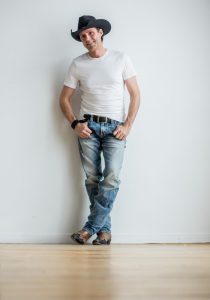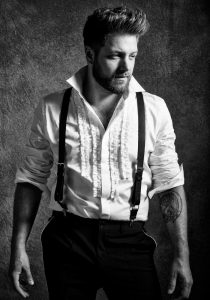Both natural-born French-speakers, Matt Lang and Laurie LeBlanc are eying country music’s Klondike with recent albums performed in Shania Twain’s language, as part of a charm offensive targeting the rest of Canada (ROC) and the world beyond.
Though they may hold varying views on topics such as music and love, these two SOCAN members are driven by similar forces and, more importantly, by similar goals. Matt Lang, originally from Québec, isn’t a stranger to performing in English: his earlier, self-titled EP did quite well on Apple Music’s national top country playlist.
Francophone Acadian Laurie LeBlanc, for his part, is trying to break out in a second language for the first time, following the release of the single “The Bigger The Better,” a song written by Irish singer-songwriter Don Mescall, whom he befriended at a dance and country music conference he attended in France. As if all roads led to the English language. As if, for LeBlanc, it had been in the cards all along.
“I’m originally from Cap-Pelé,” says LeBlanc, “and my family moved to Bouctouche when I was 10 years old. People really love their country music out here! When I was a kid, my parents and grandparents were listening to songs by Charley Pride, Kenny Rogers, and other singers of their generation. Personally, I was influenced by 1990s singers instead. That’s when Alan Jackson, and then Zac Brown, and all the rest, started out. So, listening to English songs is what got me started.”
Matt Lang – or Mathieu Langevin, to those who went to school with him in Maniwaki – also grew up listening to music from South of the border. His thing is New Country, Music City’s current sound. Still, when he hit Nashville in 2018, the big guy from Vallée-de-la-Gatineau, in the Outaouais region of Western Québec, didn’t speak a word of English.
“It wasn’t easy at first,” he recalls. “I wasn’t good at speaking English, I mean, really not good. I had some basic knowledge due to the fact that, after all, I was raised near an Indian reservation and had chums who spoke English. I don’t know, maybe I was shy… But I had to learn to speak English after I moved to Nashville. Obviously, I still have an accent. But I know it doesn’t really show when I’m singing. It took a lot of work – in fact, I had three coaches for voice, and one for pronunciation. It didn’t happen overnight!”
Another version of yourself

Laurie LeBlanc
Before recording songs for When It’s Right It’s Right, Laurie LeBlanc was known for “Moi itou Mojito,” and a handful of deliciously dry, humorous songs. The English lyrics that the New Brunswick artist chooses to sing today, however, are more serious. His lyrics are momentous, composed, and even romantic. On “Another Night Like This, he begs his new girlfriend to see him again after their first date. On “The Bigger The Better,” the character he’s impersonating has just been through a breakup, and is drowning his sorrows in a bar. Nobody knew he was capable of such drama.
“Without claiming that Don Mescall’s lyrics are darker,” says LeBlanc, “he writes about stuff that’s less festive than mine, and I love the result… Honestly, I must also say that this first English-language album blends together plenty of country pop, and maybe country-rock, influences. My producer Jason Barry and I discussed that… Maybe I’m also searching for my English voice. In French, I’ve had my own sound for the last couple of albums.”
A comparatively modest artist, Laurie LeBlanc still is a dreamer, proving that a man can be ambitious without being pretentious. The first song on his album plainly describes the opportunities the musician is hoping to seize.
Just like his Maritime colleague does, Matt Lang lays his cards on the table from the initial bars of “More,” the first song on his new album. Bent on success, he’s determined to the point of breaking down doors. “I’m saying this quite humbly,” he explains. “I’m not one to pat myself on the back in real life, but I honestly think I have lots of drive. I seem to be unable to stay home doing nothing. I don’t just wait for the phone to ring. I create my own opportunities, but while respecting other people. I’m a team player. Always have been.”
Remembering where you come from

Matt Lang
The fact that Laurie LeBlanc and Matt Lang dare to acknowledge the pull of the rest of Canada, doesn’t mean that they’re denying their true nature. Authenticity is a country music staple, and these two artists aren’t denying it. Far from it. LeBlanc’s arrangements for “Belle of the Ball” and “All In” echo the fast violin work and emblematic reels for which Acadian music is known.
Lang, on the other hand, alludes to the geographic isolation of the land of his birth in “Getcha” (an auto mechanic’s fantasy along an isolated road) and “Better When I Drink.” Instead of being presented as a nice place to live, the city becomes a symbol for special occasions and boozy parties. This duality between city and country spaces is an ongoing concern in LeBlanc’s career and writing.
“In Quebec, all TV networks are concentrated in Montréal,” says Lang. “When you’re coming from far away, let’s say from Gaspésie or Abitibi, whatever, it’s as if your dream was, like, pretty unreachable. When you’re coming from a remote area, you feel unable to get to [where you want to be]. I, for one, have always wanted to prove that wrong!”
Laurie LeBlanc, too, is hoping to make it beyond the limited territory to which he has so far restricted himself. Already very popular with Francophone Canadians, he realizes that he’ll have to climb the ladder all over again as he moves westward. He won the Male Country Artist of the Year at the Josie Music Awards last year, which helps. There is no point denying that the buzz is there, but the Canadian-American league isn’t an easy on to break into, partly because it’s a far more crowded field.
“I must admit that the English-language market is humongous!” says LeBlanc. “When I listen to the radio, there are artists there that I don’t even know who are releasing stuff, and it’s great production. In the Maritimes, our fans love and support us. We’re delighted, and we feel lucky. Let’s say that, back home, opportunities come to us more quickly… On radio, I’ll now be competing with Brett Kissel and all the rest, with major labels. We’ll have to see how it goes, but we’re happy with the product…
“I wasn’t raised on five course meals,” as one of his lyrics points out, but the self-produced musician already enjoys the support of top U.S. country artists. Blake Shelton writer Dallas Davidson, Don Shlitz, and Mike Reid (these last two, Grammy Award winners) are adding their names to his list of prestigious collaborators. And Matt Lang, too, is being backed by many big names, including Tebey and Danick Dupelle, who sense his star potential.
As if, in the end, the future of Canadian country music were destined to have a slight French accent.